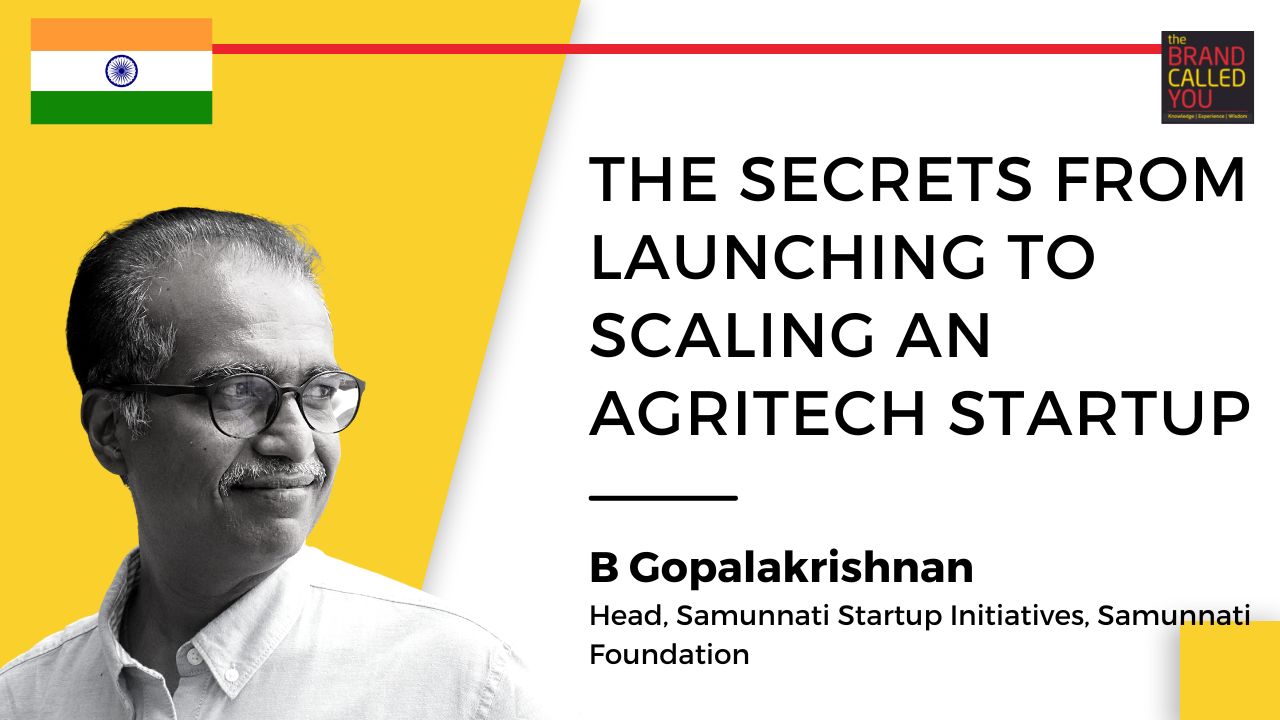B Gopalakrishnan, Head, Samunnati Startup Initiatives, Samunnati Foundation
- Mr. Gopalakrishnan is the Head of Samunnati Startup Initiatives, which is a part of the Samunnati Foundation.
Podcast
Overview
India, as we know, is the land of agriculture. With an increasingly healthy environment provided for the start-up ecosystem, there are a lot of novel ideas springing in the field of agritech startups. Today, we discuss the kind of ideas, investments, and qualities needed for success in this field.
[00:31] – About B Gopalakrishnan
- Mr. Gopalakrishnan is the Head of Samunnati Startup Initiatives, which is a part of the Samunnati Foundation.
- He worked in HCL for around 28 years.
- He shifted to the social sector as he believes if there is energy that can transform into multiple practices, we should give it to the social sector.
[02:07] – Tell me about Samunnati and the work that you are doing.
- Samunnati has two entities.
- One is called Samunnati Financial Intermediation and Services Pvt. Ltd. and the other one is Samunnati Agricultural Services.
- Samunnati Foundation is part of the Samunnati Group. We have fellowship programs, a samaram, a community kitchen, and a center of excellence.
- I, primarily, work with agritech startups. Samarambh is the platform where we connect with incubators across the country.
[06:16] – What are some challenges that a lot of entrepreneurs face in agriculture that you are supporting and helping them to solve?
- Entrepreneurs come in different stages from stage 1 to stage 5, for example, from the problem to the idea to the product to the market to the business.
- For each stage, there is some amount of hand-holding is required. For example, the founder development is one of the key aspect of entire development. We give them specific mentor connections.
- Another intervention is with respect to market connect because most of the time, if the product is ready, it needs to be curated.
- We have a large pool of FPOs that consume and validate the product.
- They also need finance interventions which can be debt, investment or short-term credit.
[08:38] – What are some of the factors you consider before making an investment?
- We focus on the novelty of the idea.
- We also focus a lot on team composition to check whether they have vertical knowledge.
- Furthermore, we also try to gauge if they have the agility to solve the large problem.
[16:12] – When should they start to scale up?
- For scaling up, we always look for a proof.
- For instance, at the initial level, we look for proof of the problem, value, and product.
- The scaling up come sup on the proof of business.
- For instance, my product is being used by 3 out of 10 customers or 4 out of 10 customers. This proves the traction that is happening.
- The product market fix is the crucial component for startups to look for and scale up.
RESOURCES:
You can connect with B Gopalakrishnan – LinkedIn
Enjoy this podcast?
If you learned new insights about the agritech startup sector, subscribe and share it with friends!
Love to give us 5 stars? ⭐⭐⭐⭐⭐ If you do, we’d love a review from you. Help us reach more people to keep them in the know as we talk to leaders, high achievers, and thought leaders from diverse backgrounds and nationalities. Excellence can come from anywhere; stay in the know, and hear from emergent high achievers and gurus.
Stay updated with what’s shaping the world today through the latest The Brand Called You Podcast episode. Follow us on iTunes, Spotify, and Anchor.fm.
Don’t forget to follow and message us on these platforms!
Website: https://tbcy.in/
Facebook: https://www.facebook.com/followtbcy
LinkedIn: https://www.linkedin.com/company/tbcy/
Twitter: https://twitter.com/followtbcy
YouTube: https://www.youtube.com/c/followtbcy
Thanks for listening!
Profile
- Mr. Gopalakrishnan is the Head of Samunnati Startup Initiatives, which is a part of the Samunnati Foundation.
- He worked in HCL for around 28 years.
- He shifted to the social sector as he believes if there is energy that can transform into multiple practices, we should give it to the social sector.


